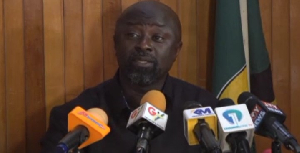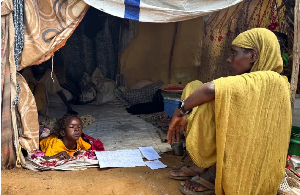(Part I)
By Dr. Michael J.K. Bokor
Tuesday, May 22, 2012
The Supreme Court’s judgement, legitimizing Jake Obetsebi-Lamptey’s acquisition of a state property (bungalow) is bad. It flies in the face of decency and sets a very horrible precedent that won’t encourage good citizenship for the benefit of our democracy.
Let’s be bold enough to tell those judges whose decision favoured Obetsebi-Lamptey that they have given Ghanaians a backhanded slap in the face. And we won’t take it without question.
Those simpletons who have already politicized the case and seen the verdict through an NDC-NPP dichotomy are sick in the head as well. This case is not a loss for the Mills government and a win for the NPP. It is a matter of public conscience and how the Supreme Court has harmed it.
The case is not only limited to the two plaintiffs (Samuel Okudzeto Ablakwa, Deputy Minister of Information, and Dr. Omane Boamah, Deputy Sports Minister) who had dragged the NPP chairman to court accusing him of abusing his office in his purchase of a government building at the No. 2 Mungo Street in the Ridge residential area of Accra.
It is one of huge public interest as well because of the tendency on the part of those close to the corridors of power to manipulate the system for personal gains. This suit was meant to produce a verdict that could curtail that white-collar thievery to protect public property from being looted. It was a step in the right direction.
But by a 4–3 majority decision, the Supreme Court held today that Obetsebi-Lamptey had the right under the constitution to purchase the bungalow in which he lived “because the bungalow was bought in his capacity as a citizen and not a Minister.”
Apart from the one who presided (Justice Atuguba), there were eight judges on the panel (Ms. Justice Sophia Akuffo, Mr. Justice S. A. Brobbey, Mrs. Justice Sophia Adinyira, Mrs. Justice Rose Owusu, Mr. Justice Jones Dotse, Mr. Justice Baffoe Bonnie, Mr. Justice B. T. Aryeetey, and Mrs. Justice Vida Akoto Bamfo). How come that there should be a 4–3 decision (coming from 7 judges as it stood)? I see five main aspects of this bad precedent set by the Supreme Court to comment on, not as a lawyer, but as a loyal Ghanaian who is intelligent enough to question the rationale behind the judges’ decision.
Bad precedent Number One (capacity as a citizen and not a Minister): Was Obetsebi-Lamptey not a citizen of Ghana at the same time that he was a Minister in Kufuor’s government? Can one be separated from the other for purposes of this transaction? In other words, is it possible for him to attempt acquiring the property as a Minister and not be counted as a citizen of Ghana at the same time? What difference does it make for him to come across as a Minister and not as a citizen in this transaction? Again, how many Ghanaians can have the opportunity to live in state-provided bungalows and end up buying them as citizens and not Ministers? This is where this bad precedent worsens into a painful aberration that the judges at the Supreme Court who ruled in favour of Obetsebi-Lamptey have committed. Common sense (even in law?) is in trouble here!!
We must be reminded that by the time he was making moves to acquire that bungalow, Obetsebi-Lamptey had over-stayed his welcome. He was no longer serving as a Minister and should have vacated that property long ago; but he didn’t, apparently because of the machinations in place at the time under the Kufuor government for such characters to enjoy life at the expense of the Ghanaian tax payer. That is the NPP’s mantra of property-grabbing democracy on open display. If he had vacated that bungalow for another Minister or government official to occupy, could he have gone ahead to acquire it? Was he not taking undue advantage of his position in the government circles?
I remember very well how not long ago, a high-ranking judge (Mr. Justice Adzoe) was forcibly chased out of the official bungalow that he was occupying. We were told that he was on retirement and no amount of entreaties from him could save the situation. Obetsebi-Lamptey wasn’t qualified to live in that bungalow at the time but he did so and turned round to acquire it. What sort of justice administration system will allow this kind of thievery to which the Supreme Court has given its blessing?
Bad Precedent Number Two:
By this verdict, the Supreme Court has legitimized wrong-doing in public service and created the nasty impression that anybody who has access to state property can acquire it because it is his/her right to do so.
The Supreme Court has done Ghanaians a huge disservice and must be condemned as such. I am already doing so because its decision doesn’t reflect the reality of the Ghanaian condition. We are talking about the situation in which everything going on in the country is to the advantage of the politicians while ordinary Ghanaians whose toil sustains the national economy are left to the vagaries of life to suffer excruciating poverty till death do them part. I am depressed at this decision because of the grimness of its impact. Having already abolished end-of-service benefits for public sector workers, these same politicians turn around to manipulate the system for personal gains. That is why the former Speaker of Parliament under the Kufuor government (Begyina Sekyi-Hughes) could strip his official bungalow of all its property and cart to his private residence to claim as his entitlements. He hasn’t been taken to task because those who are to do so are themselves busily looting the state. We could tell from the madness with which government officials (first under Rawlings and then Kufuor) looted official cars/vehicles and other property when leaving office after the 2000 and 2008 general elections and the transition to a new administration that the frenzy won’t end.
And with this decision by the Supreme Court, a new impetus has been given to this official thievery to divest the state of its assets. I am appalled beyond measure. So should you be too.
Bad Precedent Number Three:
By its decision, the Supreme Court claims that the two Deputy Ministers (plaintiffs) failed to prove the conflict of interest allegation that they had levelled against Obetsebi-Lamptey. This is just a futile legalistic bombast. Couldn’t it already be obvious that as a high-profile government functionary (even if no more a Minister of state), Obetsebi-Lamptey’s status conflicted with what he had done to acquire the bungalow?
How was the price of the bungalow determined without any undue browbeating or influence (his being a high-ranking official of the party whose government was in power at the time)? What else did the judges need to know before seeing the conflict of interest in this matter?
To be continued…
• E-mail: mjbokor@yahoo.com
• Join me on Facebook at: http://www.facebook.com/mjkbokor
Opinions of Thursday, 24 May 2012
Columnist: Bokor, Michael J. K.








![Emmanuel Tetteh George and his wife Ruth Ewoenam [Image Credit: Manuel Photography] Emmanuel Tetteh George and his wife Ruth Ewoenam [Image Credit: Manuel Photography]](https://cdn.ghanaweb.com/imagelib/pics/943/94388192.295.jpg)





